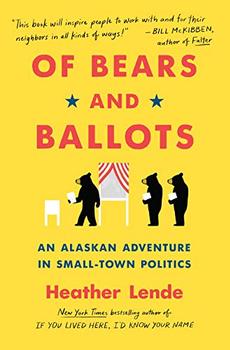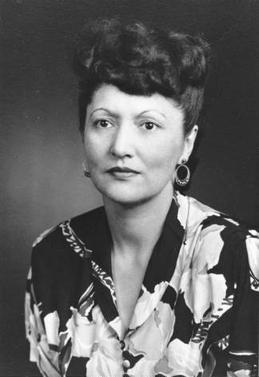Summary | Excerpt | Reviews | Beyond the Book | Read-Alikes | Genres & Themes | Author Bio

An Alaskan Adventure in Small-Town Politics
by Heather LendeThis article relates to Of Bears and Ballots
 In Of Bears and Ballots, Heather Lende reflects on the contributions of Elizabeth Peratrovich to Alaskan history during a community event celebrating the activist's life.
In Of Bears and Ballots, Heather Lende reflects on the contributions of Elizabeth Peratrovich to Alaskan history during a community event celebrating the activist's life.
Elizabeth Peratrovich (1911-1958) worked tirelessly to achieve equality for Alaskan Natives. Those familiar with Peratrovich likely know of her role in passing the first anti-discrimination bill in the United States: Alaska's Anti-Discrimination Act of 1945. Her powerful testimony to Alaska's Territorial Legislature is believed to have split the opposition, allowing for the bill's passage. However, her commitment to civil rights and equality was lifelong.
Peratrovitch was born in Petersburg, Alaska as a member of the Tlingit Nation, an original people of the Pacific Northwest Coast. After being orphaned as a young child, Elizabeth was adopted by Mary and Andrew Wanamaker. She grew up poor, with her father Andrew working as a fisherman and Presbyterian minister. In addition to the limited opportunities afforded to her because of her family's modest socioeconomic situation, Elizabeth faced discrimination because she was Indigenous. At the time, signs reading "No Natives Allowed" and "No Dogs, No Natives" were common. Speaking a Native language was prohibited in schools and on reservations because it was considered "uncivilized." Native people were routinely denied access to hospitals, restaurants, theaters, schools and shops.
In 1933, Elizabeth married Roy Peratrovich, who was part Tlingit. The couple became increasingly active in the local Indigenous communities. By the time their family moved to Juneau, Alaska in 1941, Roy led the Alaska Native Brotherhood, and Elizabeth was Grand President of the Alaska Native Sisterhood. As the United States entered World War II later that year, the couple was infuriated at the open discrimination happening at home. How could the United States go to war against the racist, xenophobic Hitler while treating its own people so poorly? Writing to Governor Ernest H. Gruening about the "outrageous" signs forbidding Native people entry and service at one local establishment, they explained: "[The business owner] does not seem to realize that our Native boys are just as willing as the white boys to lay down their lives to protect the freedom that he enjoys."
After that letter, Elizabeth Peratrovich's efforts expanded. She traveled by plane to the most remote areas of Alaska to raise awareness, rally support and organize Indigenous people. Although the first attempt to pass anti-discrimination legislation failed with a tie vote in 1943, Elizabeth escalated her organizing in the following years. She persuaded three Alaskan Natives to run for election in the legislature, which prompted discussions about Indigenous issues in the government. By the time Peratrovich delivered her 1945 testimony, her message was stirring and potent: "No law will eliminate crimes but at least you as legislators can assert to the world that you recognize the evil of the present situation and speak your intent to help us overcome discrimination."
Although a full transcript of Peratrovich's famous remarks is unavailable, reports note that she went on to emphasize the importance of addressing the structural discrimination against Native Alaskans, calling for equal housing, school and job opportunities, and denouncing the venomous cultural discrimination of the racist slurs and signs prevalent in Alaska.
Elizabeth Peratrovich died of breast cancer at the age of 47, but her legacy continues to inspire activists in Alaska and beyond. For example, Alicia Maryott, a member of the Alaska Native Sisterhood who advocates on behalf of missing and murdered Indigenous women, admires Peratrovich's radical approach to creating change. Maryott explains that Peratrovich "made it clear that asking for equal rights implies that they're someone else's to give." Instead of being moderate and pandering for public support, Peratrovich radically carved a path for taking back the rights that were stolen from her and other Alaska Natives. Similarly, activist Miciana Alise has spoken on Peratrovich's instrumental efforts to obtain "racial equality in Alaska and for all Native people" by realizing her power and using her voice.
In 1988, Alaska Legislature made February 16th Elizabeth Peratrovich Day. Michael E. Roberts, First Nations President and CEO, has urged the rest of the United States to recognize the groundbreaking contributions of Indigenous activists like Elizabeth Peratrovich as well. Decades before the civil rights movement outlawed Jim Crow laws and passed the federal Civil Rights Act of 1964, Peratrovich took a courageous stand.
Elizabeth Peratrovich, courtesy of Alaska's Digital Archives
Filed under People, Eras & Events
![]() This "beyond the book article" relates to Of Bears and Ballots. It originally ran in July 2020 and has been updated for the
May 2021 paperback edition.
Go to magazine.
This "beyond the book article" relates to Of Bears and Ballots. It originally ran in July 2020 and has been updated for the
May 2021 paperback edition.
Go to magazine.




I always find it more difficult to say the things I mean than the things I don't.
Click Here to find out who said this, as well as discovering other famous literary quotes!
Your guide toexceptional books
BookBrowse seeks out and recommends the best in contemporary fiction and nonfiction—books that not only engage and entertain but also deepen our understanding of ourselves and the world around us.